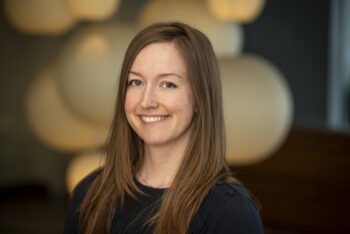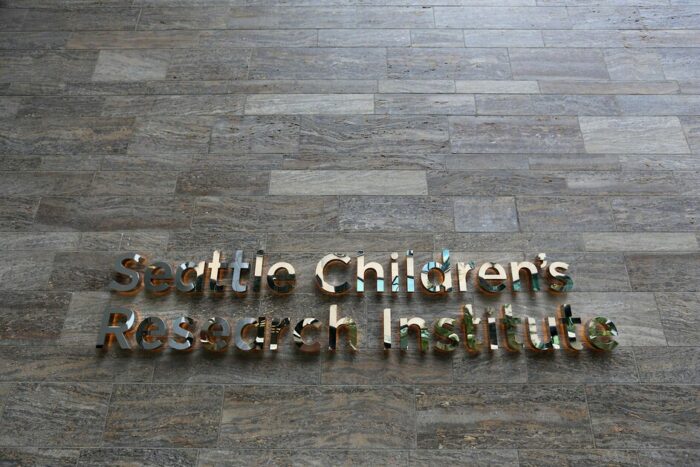
Dr. Molly Taylor recently found a long-forgotten journal from her college years. In it, she asked her young adult self: “Do I want to be a pediatric oncologist?” It turns out she did, and she went to medical school after studying psychology and microbiology as an undergrad.
Bringing together of all those disciplines, today she’s serving patients with cancer by studying how the body and mind intersect to impact survival.
Dr. Taylor is both a Seattle Children’s oncologist and a researcher who runs the Biobehavioral Oncology Research Program in the Ben Towne Center for Childhood Cancer Research at Seattle Children’s Research Institute. The program studies how psychosocial and neuroimmune processes influence pediatric and adolescent and young adult (AYA) patients with cancer.
The research team focuses on identifying and understanding how positive and negative biological, psychological and social (biopsychosocial) factors — like stress, anxiety, depression, resilience and social support — influence clinical cancer outcomes and quality of life for patients. The goal is to better understand those issues and create behavioral and medical interventions to help support whole-person care.
She spends about 25% of her time treating mainly AYA patients with solid tumors and the rest of her time doing research. “I couldn’t imagine a better job,” she says. “I grew up in a really small town so connections and community are really important to me. Clinically, I get to be with these patients and their families in the most intense situations, the extremes of unimaginably hard and sad and euphorically happy through this whole swing of their disease trajectory.”
Wearing her research hat brings Dr. Taylor equal joy. “I’m so fascinated by both the social sciences and the biological sciences and understanding how they come together for both cancer development and cancer treatment. They just pair really nicely. My science itch is scratched, and I’m able to be with my patients and their families.”
AYA patients hold a special place in Dr. Taylor’s heart. “I think they’re such a fun group, and we have the most interesting conversations,” she said. “They’re in the in-between world of trying to figure out who they are as people. My patients are often diagnosed when they’re in college or as they’re graduating from high school or about to get married — big transition points. To me, it’s always been so fascinating how these amazing kids navigate these big changes all at once.”
Among the many projects she’s juggling, Dr. Taylor has launched a new pilot study that aims to understand how a patient’s subjective cancer experience maps onto their objective biology and physiology.

“We’re sitting down with AYAs and just hearing from them about their cancer experience, the aspects that have been really challenging and unexpected and the ways they’ve been in tune with their own resilience and strength,” she said.
The patients also complete validated questionnaires about quality of life, distress and resilience that more objectively measure their experience. Samples of the patients’ blood are collected to measure a gene expression pattern that is activated by stress and can increase inflammation. They also wear heart rate monitors to measure their “fight-or-flight” response. These stress biomarkers are then mapped onto patient-reported measures of stress, resilience, anxiety, and depression.
By identifying stress biomarkers and linking them with psychosocial symptoms and clinical outcomes, Dr. Taylor and her team plan to design interventions targeting the stress response.
She is excited to show more evidence that addressing patients’ feelings is essential to cures. “In oncology, the lens is widening to understand that the patient experience and their quality of life, sleep and relationships directly influence clinical outcomes,” Dr. Taylor said. “Making sure that we’re addressing our patients’ psychosocial needs isn’t just something that’s nice to do. It’s actually an integral part of cancer care.
“As we delve deeper into how different social and behavioral aspects of someone’s life feed into their biology, it changes from ‘It would be really nice if our patients weren’t anxious and depressed while we are treating them, but the important thing is curing their cancer’ to understanding they really do go hand in hand,” she said.
As she cares for AYA patients with cancer, Dr. Taylor says the young adults notice the whole-person approach at Seattle Children’s. “A lot of my patients say, ‘I feel like people really see me here. They think about the other aspects of me as a person,’” she said. “We really pay attention to these components of somebody’s life outside of the hospital.”
While she is learning plenty from blood samples and surveys, Dr. Taylor cherishes what she learns about character and determination from her patients. “When I tell people I’m a pediatric oncologist, I usually get a look like, ‘Ohh, is it really hard?’ And some days are so, so hard, but I have a window into how strong and resilient and capable human beings are. It’s just awe-inspiring what our patients and families endure, often with a smile,” she said. “Some of these teens are 16 going on 50 because they’ve lived more life in their chunk of time than a lot of people have.”
Tending patients while pregnant last year, she was touched by the interest her patients took in her well-being. “Even my patients who were sick and in the throes of something really hard would make sure I was doing OK,” Dr. Taylor said. “They were going through the toughest thing that any teenager or parent could ever imagine, but they still had it in them to check on me.
“Sometimes the world can feel like kind of a harsh place, to be honest, but to be able to see what people are capable of is a total honor.”

